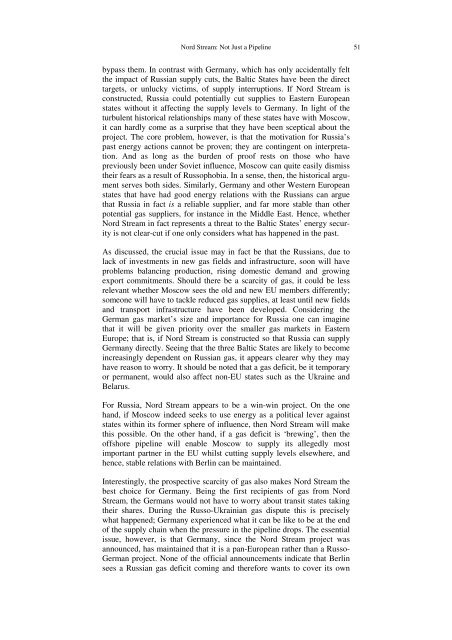Nord Stream: Not Just a Pipeline
Nord Stream: Not Just a Pipeline
Nord Stream: Not Just a Pipeline
You also want an ePaper? Increase the reach of your titles
YUMPU automatically turns print PDFs into web optimized ePapers that Google loves.
<strong>Nord</strong> <strong>Stream</strong>: <strong>Not</strong> <strong>Just</strong> a <strong>Pipeline</strong> 51<br />
bypass them. In contrast with Germany, which has only accidentally felt<br />
the impact of Russian supply cuts, the Baltic States have been the direct<br />
targets, or unlucky victims, of supply interruptions. If <strong>Nord</strong> <strong>Stream</strong> is<br />
constructed, Russia could potentially cut supplies to Eastern European<br />
states without it affecting the supply levels to Germany. In light of the<br />
turbulent historical relationships many of these states have with Moscow,<br />
it can hardly come as a surprise that they have been sceptical about the<br />
project. The core problem, however, is that the motivation for Russia’s<br />
past energy actions cannot be proven; they are contingent on interpretation.<br />
And as long as the burden of proof rests on those who have<br />
previously been under Soviet influence, Moscow can quite easily dismiss<br />
their fears as a result of Russophobia. In a sense, then, the historical argument<br />
serves both sides. Similarly, Germany and other Western European<br />
states that have had good energy relations with the Russians can argue<br />
that Russia in fact is a reliable supplier, and far more stable than other<br />
potential gas suppliers, for instance in the Middle East. Hence, whether<br />
<strong>Nord</strong> <strong>Stream</strong> in fact represents a threat to the Baltic States’ energy security<br />
is not clear-cut if one only considers what has happened in the past.<br />
As discussed, the crucial issue may in fact be that the Russians, due to<br />
lack of investments in new gas fields and infrastructure, soon will have<br />
problems balancing production, rising domestic demand and growing<br />
export commitments. Should there be a scarcity of gas, it could be less<br />
relevant whether Moscow sees the old and new EU members differently;<br />
someone will have to tackle reduced gas supplies, at least until new fields<br />
and transport infrastructure have been developed. Considering the<br />
German gas market’s size and importance for Russia one can imagine<br />
that it will be given priority over the smaller gas markets in Eastern<br />
Europe; that is, if <strong>Nord</strong> <strong>Stream</strong> is constructed so that Russia can supply<br />
Germany directly. Seeing that the three Baltic States are likely to become<br />
increasingly dependent on Russian gas, it appears clearer why they may<br />
have reason to worry. It should be noted that a gas deficit, be it temporary<br />
or permanent, would also affect non-EU states such as the Ukraine and<br />
Belarus.<br />
For Russia, <strong>Nord</strong> <strong>Stream</strong> appears to be a win-win project. On the one<br />
hand, if Moscow indeed seeks to use energy as a political lever against<br />
states within its former sphere of influence, then <strong>Nord</strong> <strong>Stream</strong> will make<br />
this possible. On the other hand, if a gas deficit is ‘brewing’, then the<br />
offshore pipeline will enable Moscow to supply its allegedly most<br />
important partner in the EU whilst cutting supply levels elsewhere, and<br />
hence, stable relations with Berlin can be maintained.<br />
Interestingly, the prospective scarcity of gas also makes <strong>Nord</strong> <strong>Stream</strong> the<br />
best choice for Germany. Being the first recipients of gas from <strong>Nord</strong><br />
<strong>Stream</strong>, the Germans would not have to worry about transit states taking<br />
their shares. During the Russo-Ukrainian gas dispute this is precisely<br />
what happened; Germany experienced what it can be like to be at the end<br />
of the supply chain when the pressure in the pipeline drops. The essential<br />
issue, however, is that Germany, since the <strong>Nord</strong> <strong>Stream</strong> project was<br />
announced, has maintained that it is a pan-European rather than a Russo-<br />
German project. None of the official announcements indicate that Berlin<br />
sees a Russian gas deficit coming and therefore wants to cover its own













